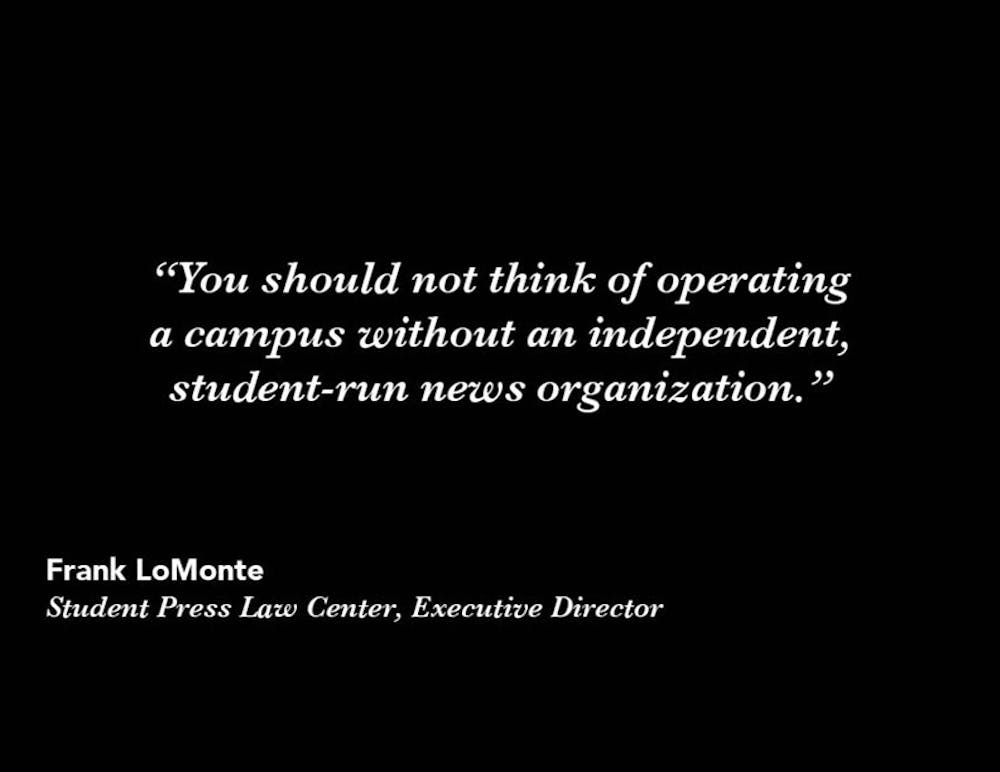Dependence on university funds leaves newspapers vulnerable
By Megan Zahneis, News Editor
Four major players in the university media community released a joint report Thursday detailing what they view as dangers to the independence of student media organizations.
A committee of representatives from the American Association of University Professors (AAUP), the College Media Association (CMA), the Student Press Law Center (SPLC) and the National Coalition Against Censorship (NCAC) collaborated on the nine-page report, "Threats to the Independence of Student Media."
The document details the role student media play in university communities, citing recent examples in which student media faculty advisers and students alike have been prone to censorship, disciplinary action and removal from their positions after publishing material perceived as damaging to administrators.
Yesterday's report was the brainchild of staffers at the Student Press Law Center, including executive director Frank LoMonte.
"We had a string of especially bad incidents over the last two years, where advisors were being pushed out of their jobs in very blatantly retaliatory ways for what their students had written," LoMonte said. "What we wanted to do was start a national conversation about the hostile climate on many college campuses for journalism [and] the fact that many campuses don't view journalism as an asset, or as having any civic importance, but as an annoyance to be stomped out."
And in many communities, like Oxford, student media may be the main source of public information, according to NCAC executive director Joan Bertin.
"We're all aware that with the pressures on print media in many communities, in many college communities, the student press serves a very major function in terms of providing information not just to the university community, but to the whole community, and for that reason you want [student press] to be as professional and probing as possible," Bertin said.
For that reason, LoMonte said, a free student press is crucial to a university community.
"Just like the campus would not think of operating without a library or without wireless internet service, you should not think of operating a campus without an independent, student-run news organization," LoMonte said. "That just isn't a healthy community."
Because student media organizations are often dependent on the university they cover for financial support, the report argues, administrations sometimes cut that funding in retaliation for undesirable editorial content.
Enjoy what you're reading?
Signup for our newsletter
CMA president Kelley Lash described a kind of "soft censorship," in which university administrators block student journalists' access to information, or expect student media to only publish flattering information.
'Every college campus has somebody [whose] job is to communicate the positive things the university's doing. They're the PR people. They're supposed to spin it," Lash said. "But if that's the only information students get, then they're not getting the full picture."
Hank Reichman, AAUP's first vice president and the chair of its Committee on Academic Freedom and Tenure, said the issue is related to student journalists' First Amendment rights.
"Students who learn journalism under a regime that tells them, 'You can't ask these questions, you can't print those stories,' if they become journalists further, they're going to take those lessons right to the mass media and we won't be having a media that asks important questions," Reichman said.
"How can you teach freedom in an atmosphere that isn't free?"
You can't, according to LoMonte.
"The way that many colleges want their student media to run would be comparable to the way that media operates in a communist dictatorship as an outlet for only messages that the government approves and that reflects favorably on the current government in power," LoMonte said. "We would recognize that as being un-American if we saw it happening in China or in Russia, but we're tolerating it today on way too many college campuses."
For Ohio Newspaper Association executive director Dennis Hetzel, the issue of student media is compounded on a national scale.
"With what's just happened in our presidential election, the credibility of the media, the trust in the media has probably never been a bigger concern in American history," Hetzel said. "We've got to train really bright, bright, excellent journalists to go out into the world and do the kind of stuff that needs to be done, and we're not going to do that if we don't have great student publications, great student-run broadcast and digital outlets."
Miami University AAUP advocacy chapter co-president Keith Tuma shares Hetzel's opinion, but feels that in Oxford, students and faculty need not worry about free press issues.
"My sense is that at Miami, the administration has been remarkably hands-off, and has believed and acted on the belief that freedom of the press is significant and matters in the student publications," Tuma said.
"You can understand why the university always wants to be represented as favorably as possible, because it's in the business of recruiting students and retaining students and all that. But I think the administration here has been aware that there's a principle at stake that's more important than any kind of needs for recruitment or retention."




